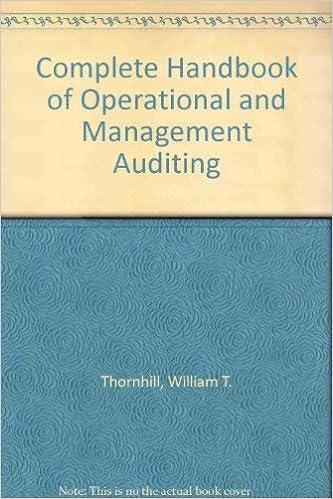Question
Which internal control procedure would be most cost-effective in dealing with the following expenditure cycle threats? A purchasing agent orders materials from a supplier that
Which internal control procedure would be most cost-effective in dealing with the following expenditure cycle threats?
A purchasing agent orders materials from a supplier that he partially owns.
Receiving-dock personnel steal inventory and then claim the inventory was sent to the warehouse.
An unordered supply of laser printer paper delivered to the office is accepted and paid for because the price is right. After all of the laser printers are jammed, however, it becomes obvious that the bargain paper is of inferior quality.
The company fails to take advantage of a 1% discount for promptly paying a vendor invoice.
A company is late in paying a particular invoice. Consequently, a second invoice is sent, which crosses the first invoices payment in the mail. The second invoice is submitted for processing and also paid.
Inventory records show that an adequate supply of copy paper should be in stock, but none is available on the supply shelf.
The inventory records are incorrectly updated when a receiving-dock employee enters the wrong product number at the terminal.
A clerical employee obtains a blank check and writes a large amount payable to a fictitious company. The employee then cashes the check.
A fictitious invoice is received and a check is issued to pay for goods that were never ordered or delivered.
The petty cash custodian confesses to having borrowed $12,000 over the last five years.
A purchasing agent adds a new record to the supplier master file. The company does not exist. Subsequently, the purchasing agent submits invoices from the fake company for various cleaning services. The invoices are paid.
A clerk affixes a price tag intended for a low-end flat-panel TV to a top-of-the-line model. The clerks friend then purchases that item, which the clerk scans at the checkout counter.
Read Chap 13 Introduction and replicate the following diagrams and flowcharts in EITHER Word/Excel/software or in hand-writing (rather than copy and paste or even print from the textbook) and then make submission by (1) uploading Word/Excel/software file, (2) converting into PDF file and then submiting, or (3) taking pictures and then turning in. (Note: A student will receive zero if copying and pasting or even printing from the textbook).
Figure 13-1 Context Diagram of the Expenditure Cycle
Figure 13-2 Level 0 Data Flow Diagram for the Expenditure Cycle
Figure 13-3 Overview of ERP System Design to Support the Expenditure Cycle
Step by Step Solution
There are 3 Steps involved in it
Step: 1

Get Instant Access to Expert-Tailored Solutions
See step-by-step solutions with expert insights and AI powered tools for academic success
Step: 2

Step: 3

Ace Your Homework with AI
Get the answers you need in no time with our AI-driven, step-by-step assistance
Get Started


